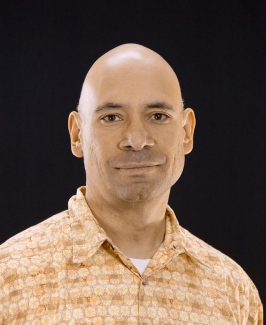Ralph Jimenez received a Department of Commerce Bronze Medal for Superior Federal Service at a ceremony held in mid-December 2016. The Medal is the highest honor presented by the National Institute of Standards and Technology (NIST). Under Secretary of Commerce for Standards and Technology and NIST Director Willie E. May presided over the awards ceremony, which was held concurrently at NIST's Gaithersburg, Maryland, and Boulder, Colorado, campuses.
Jimenez received his Bronze Medal Award "for pioneering innovative tools for transforming the measurement, characterization and collection of biomolecules and cells for applications in industry, medicine, and research." He was recognized for leading a multidisciplinary program combining ultrafast lasers, custom microfluidics, biochemistry, and directed evolution to measure and use large biomolecules and living cells for a range of applications, including more efficiently making biofuels, revealing the details of how enzymes work within cells, as well as developing new molecular tools for nondestructively imaging and measuring chemical reactions within living cells. His accomplishments include
- Inventing a new high-throughput cytometer that uses ultrafast lasers and microfluidics to nondestructively identify and collect individual living cells with unique and highly desirable properties,
- Pioneering methods to measure complex three-dimensional motions of large biomolecules, such as enzymes and proteins, in their natural cellular environments, and,
- Developing and characterizing fluorescent proteins for use in measurements of chemical and physical reactions within living cells.
Jimenez' innovations and patented innovations are accelerating the ability of basic and applied researchers to study, understand, and apply their new understanding of the biochemistry of cells in both normal and diseased states.



 The Physics Frontiers Centers (PFC) program supports university-based centers and institutes where the collective efforts of a larger group of individuals can enable transformational advances in the most promising research areas. The program is designed to foster major breakthroughs at the intellectual frontiers of physics by providing needed resources such as combinations of talents, skills, disciplines, and/or specialized infrastructure, not usually available to individual investigators or small groups, in an environment in which the collective efforts of the larger group can be shown to be seminal to promoting significant progress in the science and the education of students. PFCs also include creative, substantive activities aimed at enhancing education, broadening participation of traditionally underrepresented groups, and outreach to the scientific community and general public.
The Physics Frontiers Centers (PFC) program supports university-based centers and institutes where the collective efforts of a larger group of individuals can enable transformational advances in the most promising research areas. The program is designed to foster major breakthroughs at the intellectual frontiers of physics by providing needed resources such as combinations of talents, skills, disciplines, and/or specialized infrastructure, not usually available to individual investigators or small groups, in an environment in which the collective efforts of the larger group can be shown to be seminal to promoting significant progress in the science and the education of students. PFCs also include creative, substantive activities aimed at enhancing education, broadening participation of traditionally underrepresented groups, and outreach to the scientific community and general public.